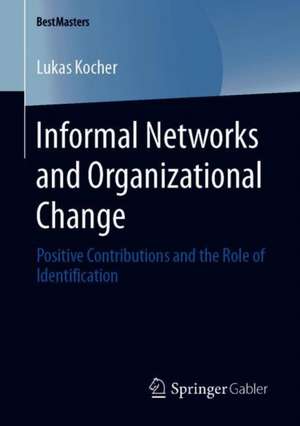Informal Networks and Organizational Change: Positive Contributions and the Role of Identification: BestMasters
Autor Lukas Kocheren Limba Engleză Paperback – 30 oct 2019
Din seria BestMasters
-
 Preț: 362.32 lei
Preț: 362.32 lei - 13%
 Preț: 367.41 lei
Preț: 367.41 lei -
 Preț: 364.14 lei
Preț: 364.14 lei - 5%
 Preț: 403.96 lei
Preț: 403.96 lei -
 Preț: 377.18 lei
Preț: 377.18 lei -
 Preț: 367.05 lei
Preț: 367.05 lei - 13%
 Preț: 364.57 lei
Preț: 364.57 lei - 13%
 Preț: 366.14 lei
Preț: 366.14 lei - 13%
 Preț: 368.35 lei
Preț: 368.35 lei -
 Preț: 391.41 lei
Preț: 391.41 lei - 13%
 Preț: 367.41 lei
Preț: 367.41 lei -
 Preț: 311.76 lei
Preț: 311.76 lei -
 Preț: 396.86 lei
Preț: 396.86 lei -
 Preț: 406.59 lei
Preț: 406.59 lei -
 Preț: 365.66 lei
Preț: 365.66 lei -
 Preț: 394.31 lei
Preț: 394.31 lei - 13%
 Preț: 365.83 lei
Preț: 365.83 lei - 13%
 Preț: 396.42 lei
Preț: 396.42 lei - 20%
 Preț: 366.22 lei
Preț: 366.22 lei -
 Preț: 364.14 lei
Preț: 364.14 lei -
 Preț: 367.05 lei
Preț: 367.05 lei -
 Preț: 346.23 lei
Preț: 346.23 lei -
 Preț: 365.59 lei
Preț: 365.59 lei -
 Preț: 392.13 lei
Preț: 392.13 lei -
 Preț: 251.34 lei
Preț: 251.34 lei - 20%
 Preț: 292.10 lei
Preț: 292.10 lei -
 Preț: 404.05 lei
Preț: 404.05 lei -
 Preț: 393.58 lei
Preț: 393.58 lei -
 Preț: 393.58 lei
Preț: 393.58 lei -
 Preț: 344.87 lei
Preț: 344.87 lei -
 Preț: 410.77 lei
Preț: 410.77 lei -
 Preț: 411.75 lei
Preț: 411.75 lei -
 Preț: 379.30 lei
Preț: 379.30 lei -
 Preț: 411.32 lei
Preț: 411.32 lei -
 Preț: 412.89 lei
Preț: 412.89 lei -
 Preț: 377.73 lei
Preț: 377.73 lei -
 Preț: 378.12 lei
Preț: 378.12 lei -
 Preț: 412.51 lei
Preț: 412.51 lei -
 Preț: 481.79 lei
Preț: 481.79 lei -
 Preț: 377.18 lei
Preț: 377.18 lei -
 Preț: 480.06 lei
Preț: 480.06 lei -
 Preț: 376.04 lei
Preț: 376.04 lei -
 Preț: 382.95 lei
Preț: 382.95 lei -
 Preț: 377.95 lei
Preț: 377.95 lei -
 Preț: 412.68 lei
Preț: 412.68 lei -
 Preț: 376.80 lei
Preț: 376.80 lei -
 Preț: 380.45 lei
Preț: 380.45 lei -
 Preț: 410.17 lei
Preț: 410.17 lei -
 Preț: 410.94 lei
Preț: 410.94 lei -
 Preț: 380.63 lei
Preț: 380.63 lei
Preț: 375.23 lei
Nou
Puncte Express: 563
Preț estimativ în valută:
71.80€ • 76.78$ • 59.87£
71.80€ • 76.78$ • 59.87£
Carte tipărită la comandă
Livrare economică 17 aprilie-01 mai
Preluare comenzi: 021 569.72.76
Specificații
ISBN-13: 9783658282837
ISBN-10: 3658282835
Pagini: 73
Ilustrații: XI, 73 p. 1 illus.
Dimensiuni: 148 x 210 mm
Greutate: 0.11 kg
Ediția:1st ed. 2020
Editura: Springer Fachmedien Wiesbaden
Colecția Springer Gabler
Seria BestMasters
Locul publicării:Wiesbaden, Germany
ISBN-10: 3658282835
Pagini: 73
Ilustrații: XI, 73 p. 1 illus.
Dimensiuni: 148 x 210 mm
Greutate: 0.11 kg
Ediția:1st ed. 2020
Editura: Springer Fachmedien Wiesbaden
Colecția Springer Gabler
Seria BestMasters
Locul publicării:Wiesbaden, Germany
Cuprins
Informal Organizational Networks.- Contributions of Informal Networks to Organizational Change.- Re-assessing Perceptions of Informal Organizational Networks.- Capturing Informality in Organizations: Countervailing Processes.
Notă biografică
Lukas Kocher (M.Sc.) studied Philosophy & Economics in Bayreuth and International Business Administration in Frankfurt/Oder, Germany.
Textul de pe ultima copertă
This thesis examines the role of informal employee networks and their potential positive contributions to a successful implementation of disruptive organizational change. It relies on an in-depth analysis of qualitative data, collected in 13 semi-structured interviews. The findings show that in times of organizational change, employees countervail the capacities of their informal networks to optimize organizational effectiveness and efficiency against the effectiveness and efficiency of prevalent formal organizational structures. A central dynamic also detected in the findings is the role of organizational identification as a key driver to engage in informal networks to positively support an organization’s change process implementation.
Lukas Kocher (M.Sc.) studied Philosophy & Economics in Bayreuth and International Business Administration in Frankfurt/Oder, Germany.
Contents
Target Groups- Informal Organizational Networks
- Contributions of Informal Networks to Organizational Change
- Re-assessing Perceptions of Informal Organizational Networks
- Capturing Informality inOrganizations: Countervailing Processes
- Scientists, lecturers, and students in the areas Organizational Management and Change Management
- Professionals in Organizational Management/Change Management
Lukas Kocher (M.Sc.) studied Philosophy & Economics in Bayreuth and International Business Administration in Frankfurt/Oder, Germany.
Caracteristici
A study in the field of organizational management
